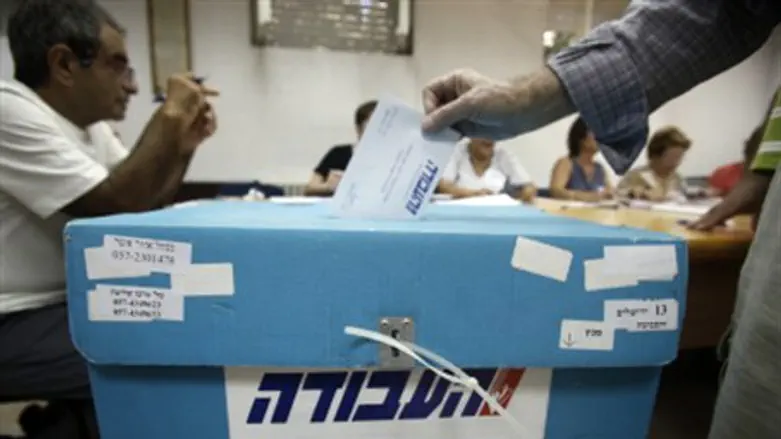
Three days after the Likud party chose its list for the Knesset, the Labor party will hold its primaries on Thursday. 450 polling stations in 70 points will open at 10:00 a.m. and close at 10:00 p.m. There will also be three mobile polling stations that will travel to remote communities and allow party members living in those communities to cast their ballots.
The primaries are expected to be a tight race between candidates favored by current party chairwoman Shelly Yechimovich and candidates favored by her bitter rival, the party's former chairman Amir Peretz.
Yechimovich, a former journalist, joined politics exactly seven years ago, on November 29, 2005, several weeks after Peretz was elected to be the Labor party’s chairman. However, the two had a falling out when Peretz chose to take the portfolio of Defense Minister in Ehud Olmert’s government, rather than demanding a socially-oriented portfolio. Yechimovich defeated Peretz in September of 2011 in the race for the party’s chairmanship.
It is expected that Yechimovich will ask party members on Thursday to vote for the candidates that she favors, such as MK Yitzchak Herzog, who placed first on the party’s Knesset list in the last two elections.
Yechimovich also favors candidates such as her former parliamentary assistant Michal Biran, and the former commander of the IDF's Sayeret Matkal, Omer Bar-Lev.
Peretz favors candidates such as Labor’s currently serving MKs Eitan Cabel, Raleb Majadele and Daniel Ben Simon. He is also promoting former Peace Now head Yariv Oppenheimer and former journalist Merav Michaeli, both of whom are undesired by Yechimovich who is trying to pull her party toward the center and fears that their being ranked in realistic spots would brand Labor as a leftist party.
The battle for the top spot on the Knesset list will be between Herzog and Peretz, and a win for the latter will mean a blow for Yechimovich. Peretz was criticized by the public over his conduct as Defense Minister during the Second Lebanon War, but has recently won praise by many, including Prime Minister Binyamin Netanyahu, for pushing for the development of the Iron Dome anti-missile system. The system had a success rate of 84% in intercepting rockets fired at southern Israel during Operation Pillar of Defense.
Michaeli has a good chance of clinching a high spot reserved for women, analysts believe. Oppenheimer may have a more difficult time getting in.
Also running for spots on the party’s Knesset list are former student leader Itzik Shmuli as well as Stav Shafir, both of whom were among the leaders of the social protests in the summer of 2011. A third candidate, journalist Mickey Rosenthal, gave the protest enthusiastic coverage. It is believed that all three will achieve realistic spots.
Other contenders include Noam Shalit, father of Gilad Shalit who was released from Hamas captivity last year. Noam Shalit was criticized this week after he attacked the current government on his Facebook page for not advancing "peace talks" with Palestinian Authority Chairman Mahmoud Abbas, while conducting contacts with Hamas.
Angry respondents to the status update accused Shalit of hypocrisy because he did not express opposition to talks with Hamas when his son was held captive by the organization. Analysts are predicting that Shalit will likely not make it to a realistic spot to become an MK.
Two MKs who left the Kadima party, Nachman Shai and Nino Abesadze, will also seek spots on Labor’s Knesset list.
Most polls have shown that under Yechimovich’s leadership Labor will likely be the second largest party in the next Knesset, after Likud Beytenu. Labor was the ruling party for many years but dropped to being the fourth largest party in the 2009 election, under the leadership of Defense Minister Ehud Barak.
Barak and four other Labor MKs split the party in 2011 and formed the Independence party. Barak announced this week that he is retiring from politics.
The Labor primaries were supposed to have taken place using the same computerized method as the Likud primaries earlier this week, but the party has learned a lesson from the many computer glitches that held back the Likud primaries. As such, Labor will use paper ballots which will be scanned by computer after polls close.
